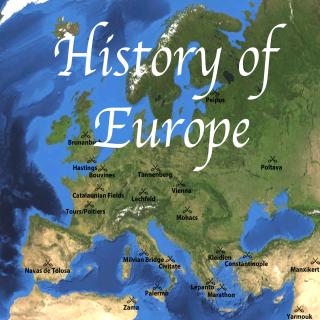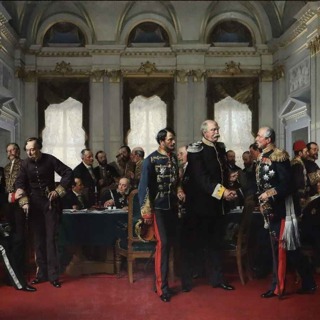
74.1 First World War - Introduction, and Treaty Of Berlin 1878
A summary of the main events from the end of the Napoleonic Wars in 1815 to the beginning of the First World War in 1914At the end of the nineteenth century the Balkans had multiple crises. The Treaty of Berlin 1878 was an attempt by the Great Powers of Europe to find a framework for stability in a region with various competing interests, many of them incompatible with each other. In effect, it created two spheres of influence in the Balkans: the Austrians’ in the west and the Russians’, together with the Serb allies, in the east.No side, however, was satisfied with Treaty. The Bulgarians were furious at having been denied the larger territory which they had won in battle. And the Serbians harboured ambitions for their borders to be expand southwards to areas inhabited by fellow Slavs, but under control partly of the Ottoman and partly the Austrians.www.patreon.com/historyeuropewww.historyeurope.netMusic composed by Ludwig van BeethovenPicture - Congress of Berlin Hosted on Acast. See acast.com/privacy for more information.
3 Helmi 202320min
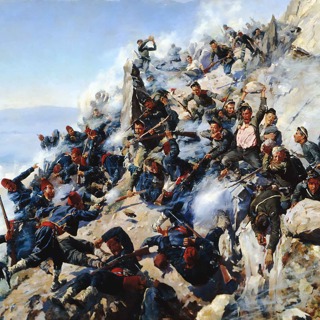
73.3 Russo-Turkish War 1877-78
In April 1877, two Russian armies invaded the Ottoman empire. The focus of the war became the siege of Plevna in Bulgaria. The strong resistance there gave the Turks real hope for a final victory, or at least holding off the enemy and forcing a more favourable diplomatic solution. www.patreon.com/historyeuropewww.historyeurope.netMusic composed by Rimsky-Korsakov: Polonaise, and Russian Easter Festival OverturePicture - The defeat of Shipka_Peak, Bulgarian War of Independence Hosted on Acast. See acast.com/privacy for more information.
16 Joulu 202222min
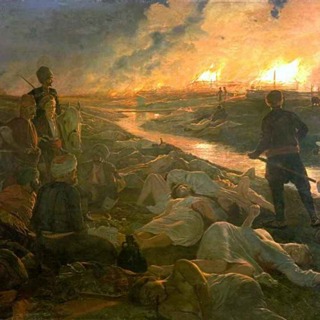
73.2 Russo-Turkish War 1877-78
In April 1876 news spread across Europe of appalling atrocities being committed in Bulgaria, by Turks against local uprisings. These occurred soon after similar events elsewhere in the Balkans region – in Bosnia and Serbia. The strongest reaction came from Russia where widespread sympathy for their fellow Slavs led to a nationwide surge in patriotismA new sultan in Constantinople, Abdul Hamid II, rejects any concessions, leading to warwww.patreon.com/historyeuropewww.historyeurope.netMusic composed by Frederic Chopin - Mazurkas in C sharp minorPicture - The Batak massacre carried out by Ottoman irregular troops in Bulgaria in 1876 Hosted on Acast. See acast.com/privacy for more information.
9 Joulu 202215min
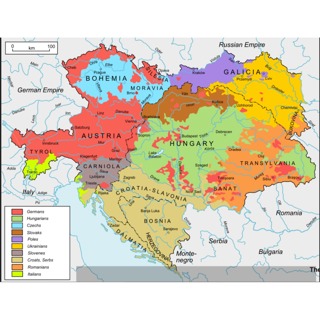
73.1 Russo-Turkish War 1877-78 - Background
In 1875, the Balkans entered a period of turmoil as various nationalities (Serbians, Bulgarians, Macedonians, Albanians and Romanians) struggled for independence from the Ottoman Turks. Uprisings quickly spread across the region and resulted in a major war between the Ottomans and Russians from 1877 to 1878.Meanwhile, Constantinople was suffering a renewed period of political instability which led to the overthrow of Sultan Abdülaziz in May 1876www.patreon.com/historyeuropewww.historyeurope.netMusic composed by Bedrich Smetana - Ma Vlast (My Fatherland), and Frederic Chopin- Nocturne in C sharp minor Hosted on Acast. See acast.com/privacy for more information.
2 Joulu 202223min

72.1 Philippa Gregory Interview
Philippa has written novels set in several different historical periods, especially the Tudor period. We discussed the period around the Glorious Revolution 1688 when the Prince of Orange invaded England from Holland and replaced James II as king, and the Battle of Sedgemoor 1685 three years before.Some of Philippa's novels have won awards and have been adapted into television dramas. The most successful of her novels has been The Other Boleyn Girl, published in 2001. Philippa has also published a series of books about the Plantagenets, the ruling houses that preceded the Tudors, and the Wars of the Roses.Her new book is called Dawnlands, the third in a series named Fairmile. Hosted on Acast. See acast.com/privacy for more information.
11 Marras 202218min
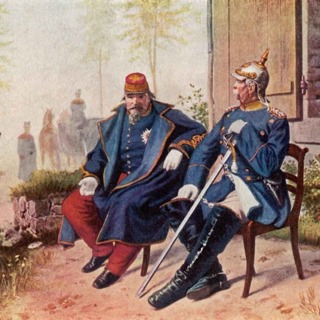
71.2 Franco-Prussian War 1870-71
For centuries, Europe’s German centre had been politically fragmented and weak. The continent had been dominated by states on the periphery, whose interest was to maintain the power vacuum at the centre. Now, however, for the first time, the Germans were united under the leadership of Otto von Bismarck and launched a major invasion into France, which ended up destroying the balance of power on the continent.www.patreon.com/historyeuropewww.historyeurope.netMusic composed by Frederic Chopin - Mazurkas in C sharp minor, Poloniase nr 7 and Predule nr 10Picture - Bismarck and Napoleon III Hosted on Acast. See acast.com/privacy for more information.
4 Marras 202227min
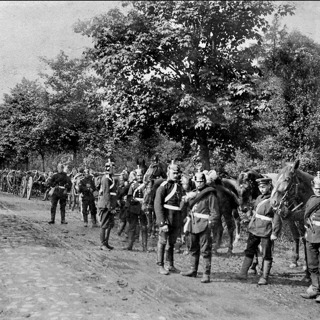
71.1 Franco-Prussian War 1870-71 - Background
Following Prussia's victory at Königgrätz in 1866, the North German Confederation became an instrument for Prussian dominance. All northern German states not directly annexed by Prussia were put in the new Confederation in which Berlin assumed control of their foreign and military affairs, and most of their internal ones as well. A solid block of Prussian territory stretched now between France and Belgium in the west to Russian Lithuania in the east.Tensions rise between Paris and Berlin, and Napoleon III of France blunders into a war against Germany for which he is not preparedwww.patreon.com/historyeuropewww.historyeurope.netMusic composed by Brahms Symphony nr 3, parts of the 2nd and 3rd movementsPicture - German troops at Torcy, in September 1870 Hosted on Acast. See acast.com/privacy for more information.
28 Loka 202223min
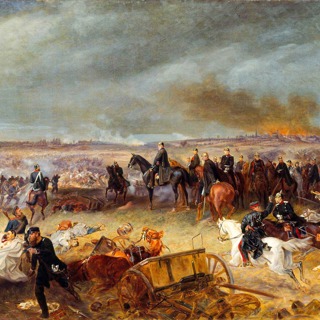
70.2 Battle of Königgrätz 1866
The Austro-Prussian War of 1866 was brief, yet its consequences were profound. It was the culminating event in a rivalry that began with the rise of the house of Brandenburg-Prussia, most notably Frederick the Great’s unprovoked attack upon the Habsburg province of Silesia in 1740. From that time Austria and Prussia were involved in a long struggle for supremacy in Germany.In 1866 Prussian armies invades Saxony and then the Austrian Empire with the main battle occurring on 3rd July 1866 at Königgrätz with immense armies on both sides.www.patreon.com/historyeuropewww.historyeurope.netMusic composed by Johannes Brahms: Symphony No. 1 in C Minor, movements 3 and 4. Also Waltz nr. 15 in A flat major. Courtesy of musopen.org Hosted on Acast. See acast.com/privacy for more information.
30 Syys 202233min
